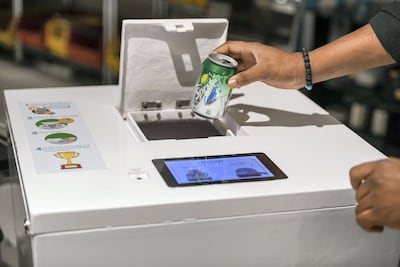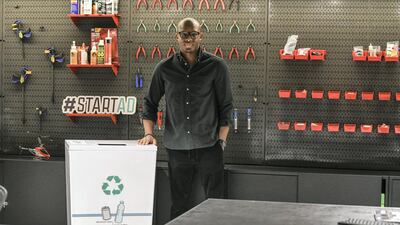A bin that can identify the rubbish thrown into it and the person using it is being trialled across the UAE as part of efforts to reduce waste.
The Smart Bin, created by a start-up company in Abu Dhabi, melds cutting-edge artificial intelligence with mobile technology to promote recycling.
As more and more people are becoming conscious of global warming and plastic waste, the Smart Bin also tells users the amount of carbon they are saving by recycling their waste.
Inspired by reverse-vending machines, which pay out a deposit in exchange for the return of a plastic bottle, the Smart Bin uses rewards to encourage more people to recycle.
Users drop in plastic, metal or glass. The bin then weighs and identifies the material and sends the user a message telling them, based on the weight, the carbon emissions that they have saved by diverting their waste from landfill.
“Today, you helped save about 7g of CO2 equivalent from being emitted by diverting recyclables away from the landfill,” is a typical message users will receive.
A company called Cycled, supported by startAD – an initiative by New York University Abu Dhabi and Tamkeen promoting early-stage technology projects – is behind the Smart Bin.
People using the Smart Bin for the first time have to enter their mobile phone number or email address. They are then sent a link to a QR code, which they scan on subsequent occasions to open the bin.
“We did a little bit of research and realised we could make the bins a little bit smarter so it can identify who’s using it and identify what’s being dropped into it,” said Ayoola Brimmo, Cycled’s chief operating officer and co-founder.

“It takes a picture and sends it to the database and identifies what the material is. We take a lot of pictures of different types of material so it can use the pixels to identify that this is most likely plastic or is most likely glass.”
Requiring users to register allows them to accumulate points on a personal account when they use the Smart Bin. Points could be used as entries into a prize draw, with prizes such as a restaurant meal or shopping vouchers on offer if the bin was in a mall.
Registration also discourages people from depositing non-recyclable material. People will be sent an alarm if they deposit the wrong type of material, ensuring that they are more careful next time. When the bin is emptied, the material in it can be sent to recycling centres.
Trials began at the DP World Tour Championship golf event in Dubai in November 2018, during which one Smart Bin user won a prize each day.
A six-month trial, run in collaboration with Abu Dhabi National Exhibitions Company, started in August last year and is ongoing. Four Smart Bins were used at the Abu Dhabi International Boat Show at Adnec Marina in October.
Further trials of an updated version – the fourth in the development process – are planned for a football club in Skien, Norway.
The Smart Bin is made of plastic but, in keeping with its aim of reducing waste, could, ultimately, be made from recycled materials.
Cycled aims to improve the Smart Bin so that it can recognise paper and even organic material such as fruit or vegetables. By April, the company hopes to have a final version capable of being commercialised with a target price of about $1,000 (Dh3,673).
As well as Mr Brimmo, a mechanical engineering doctoral student at NYU Abu Dhabi, Cycled was founded by Benedikt Pilscheur, the chief technology officer, Thor Sverre Minnesjord, the chief executive, and Prof Matteo Chiesa from Khalifa University, a director of the company. Walid Glia works on the software as a system developer.


